Key takeaways:
- Workshops foster community and collaboration, which enhance creativity and personal growth.
- Feedback from peers is invaluable for improving writing and identifying blind spots.
- Exploring vulnerability and authenticity in storytelling resonates deeply with audiences.
- Understanding storytelling structure and character development are essential skills for screenwriters.

Overview of Film Industry Training
When I first dipped my toes into the realm of film industry training, I was surprised by how many facets there were to explore. From screenwriting to directing and cinematography, each area offers its own unique set of skills and insights that can elevate your creative vision. It truly made me ponder—what aspects of filmmaking resonate most with me, and how can I grow in these areas?
Attending workshops was a transformative experience for me. I vividly remember the energy in the room during my first session; it was palpable and contagious. Being surrounded by passionate peers and seasoned professionals ignited a spark within me. Have you ever felt that rush of inspiration when you connect with like-minded individuals? It reaffirms how essential community is in this industry.
Moreover, film industry training extends beyond just technical skills. It teaches us the importance of storytelling, the pulse of emotion that comes with every frame and character. I once learned that a great script isn’t merely about words on a page; it’s about the emotions and experiences we convey. This perspective shift pushed me to dig deeper into my narratives, turning personal experiences into universal truths, and I found myself more connected to my craft than ever before.
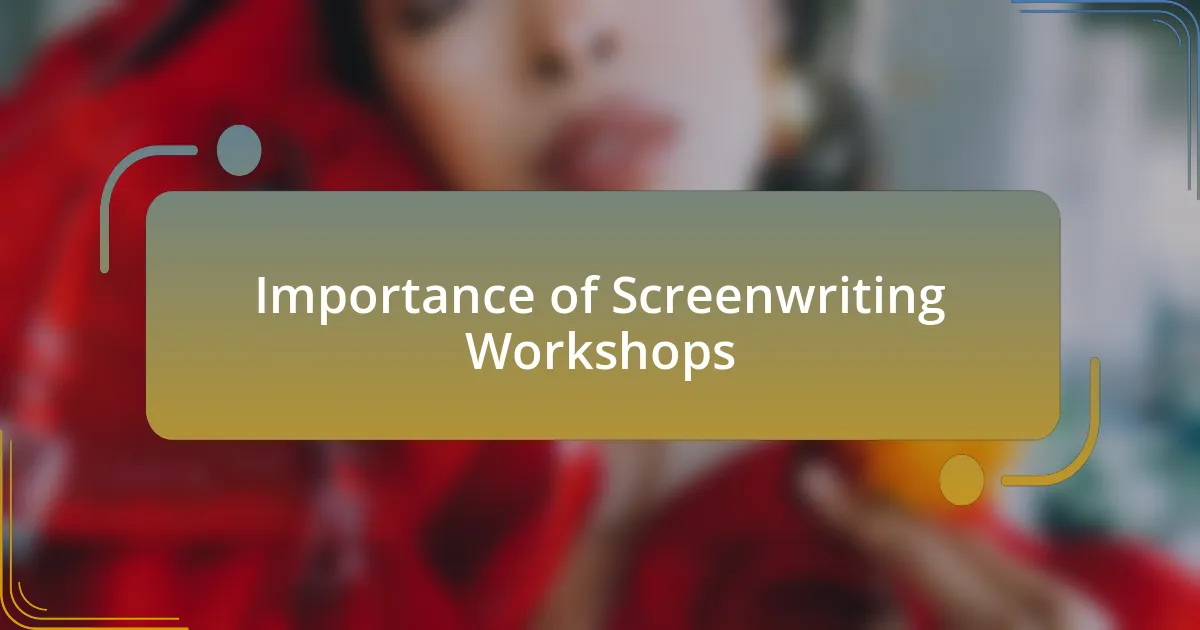
Importance of Screenwriting Workshops
Screenwriting workshops play a crucial role in refining a writer’s craft. I recall a moment during one session when our instructor challenged us to rewrite a scene in just 30 minutes. The pressure was intense, but it pushed me to think outside the box and discover new angles to my storytelling. Isn’t it fascinating how creative constraints can sometimes lead to the most innovative solutions?
Additionally, workshops offer direct feedback that is invaluable for growth. I remember sharing my draft with a group of participants; their constructive criticism opened my eyes to blind spots in my work. Have you ever been surprised by insights from someone else? It’s amazing how fresh perspectives can illuminate aspects of your writing you hadn’t considered before.
Beyond technical skills, workshops often foster a supportive environment where creativity thrives. I formed lasting connections with fellow writers, exchanging ideas and collaborating on projects. Reflecting on those interactions, I realized that nurturing relationships in this industry can bolster both personal and professional development, creating a network of encouragement and inspiration.
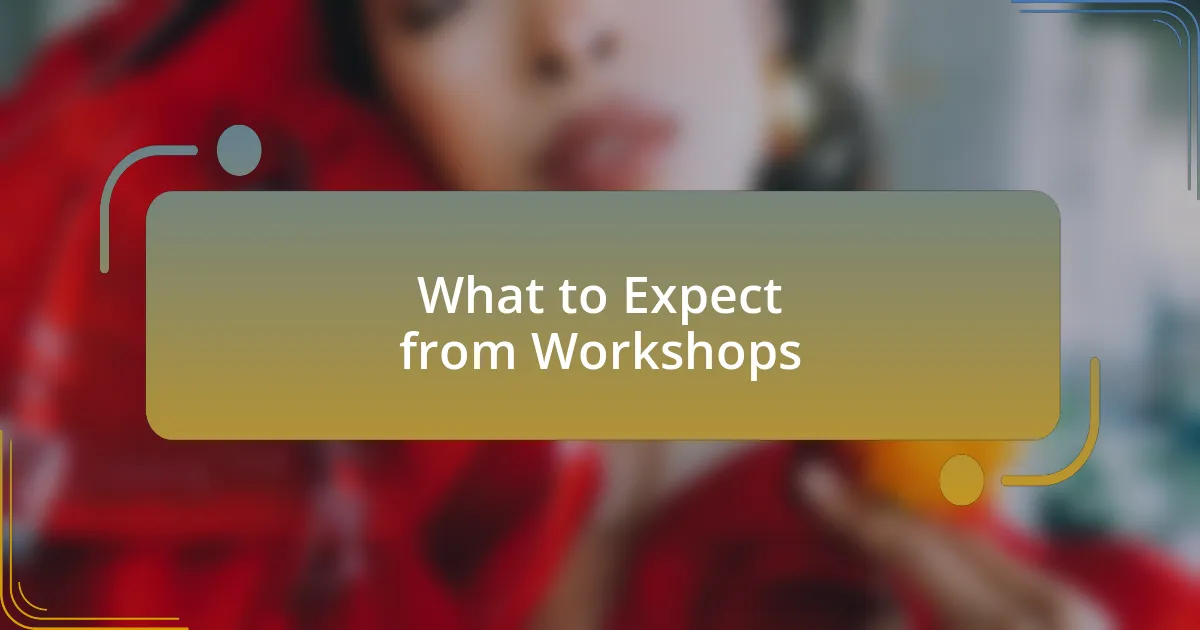
What to Expect from Workshops
When you step into a screenwriting workshop, expect to dive right into the creative process. I vividly remember my first session, where we were asked to pitch our ideas within the first hour. The adrenaline rush was palpable! Can you imagine the thrill of sharing your concept with peers and receiving immediate feedback? That initial exposure pushes you out of your comfort zone, making you more confident in presenting your ideas.
Workshops not only focus on craft but also encourage exploration of emotional depth in your writing. One exercise that stood out to me was when we had to write a monologue revealing a character’s inner struggles. It was challenging, yet cathartic. How often do we allow ourselves to dig deep and confront our vulnerabilities on the page? This kind of honest exploration can transform your writing, giving it a richness that resonates with audiences.
Moreover, the community aspect of workshops is incredibly rewarding. I can still recall bonding with participants over shared experiences and distinct perspectives. Those late-night discussions about story arcs and character development felt almost like therapy. Don’t you think that feeling a sense of belonging while engaging with like-minded individuals can significantly enhance your creative journey? It’s these shared moments that truly underscore the value of a workshop experience.
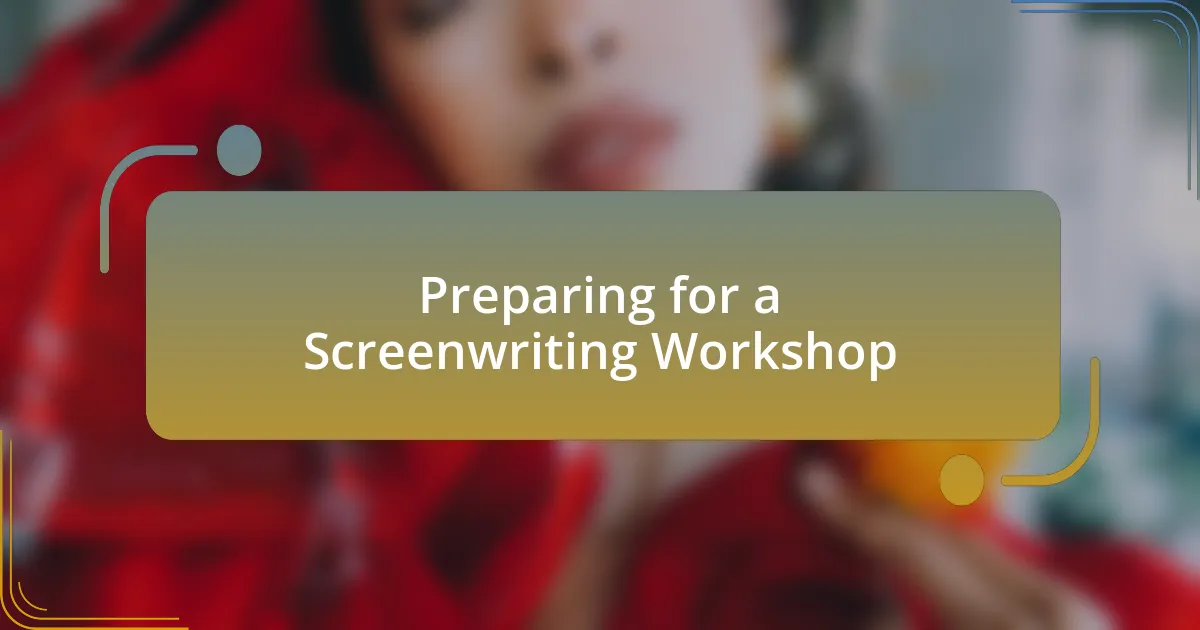
Preparing for a Screenwriting Workshop
Preparing for a screenwriting workshop goes beyond just showing up with a notebook and a pen. I remember feeling the thrill and anxiety as I pulled together my script ideas days before my first workshop. I spent hours revising my material, trying to convey the nuances of my characters in just a few lines. Have you ever felt that mix of excitement and dread before sharing your work? It’s this duality that drives many of us to refine our scripts, making sure they represent our vision.
Understanding the workshop’s structure can also make a difference. Before my workshop, I reached out to a few participants who’d attended previously. They shared valuable insights on what to bring, like copy for distribution and specific questions for the instructors. Have you ever thought how small preparations can lead to larger contributions? This step helped me feel more grounded and ready to engage.
Lastly, I urge you to set personal goals for the experience. For me, it was all about finding my voice and learning from others. I wanted to leave with not just feedback, but a renewed sense of creative purpose. What do you wish to achieve? Answering that question for yourself can illuminate your journey through the workshop, guiding your interactions and shaping the feedback you seek.
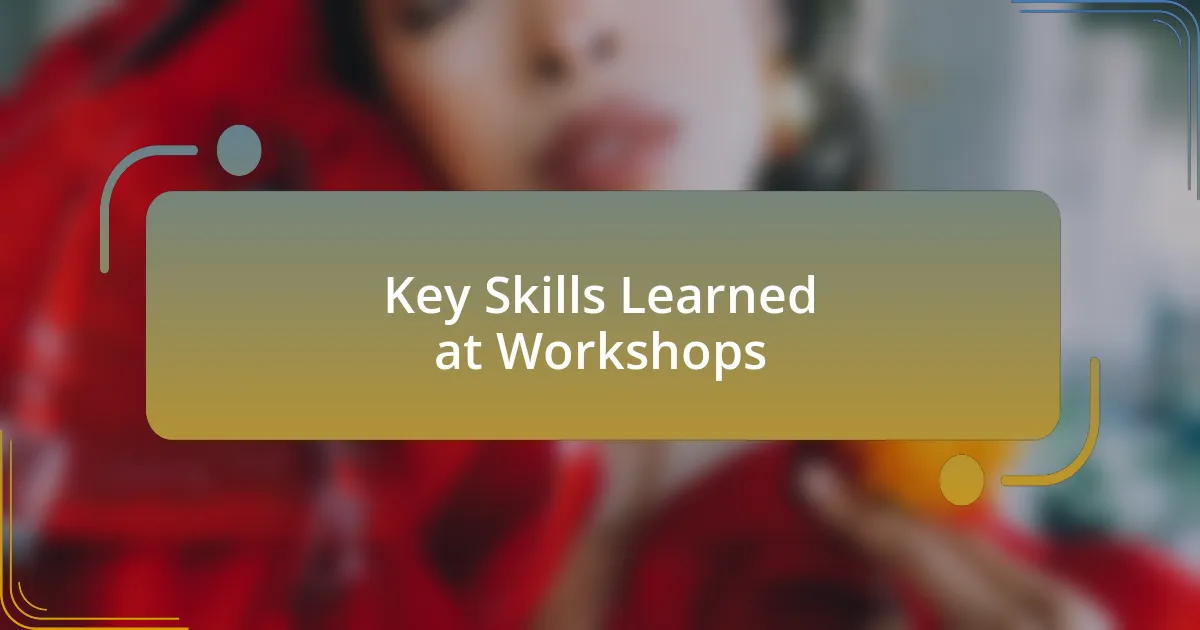
Key Skills Learned at Workshops
One of the key skills I gained from attending the workshop was storytelling structure. I vividly recall a moment when our instructor broke down the classic three-act structure, illustrating how pivotal points in a story can drive tension. Have you ever found yourself lost in a plot twist? Understanding this structure not only helped me anchor my narrative but also inspired me to evaluate the arcs of my characters in a more intentional manner.
Another crucial takeaway was the art of feedback. In my first session, I nervously shared my script, bracing for critiques. What surprised me was the supportive environment created by fellow writers; we learned that constructive criticism is a powerful tool for growth. I left with not just raw insights, but a sense of camaraderie that transformed the way I approach revising my work. Who knew that sharing vulnerabilities could lead to such valuable connections?
Lastly, I discovered the importance of character development. During breakout sessions, we placed our protagonists in challenging scenarios, forcing us to delve deeper into their motivations. I can still hear the insightful questions my peers asked that pushed me to explore my characters’ fears and desires. Have you ever faced a character that felt flat? Engaging with others taught me that multidimensional characters are the heartbeat of any script, breathing life into every scene.

Personal Insights from My Experience
Reflecting on my experience at the workshop, one of the most eye-opening aspects was the emphasis on vulnerability in writing. I recall a moment when I shared a deeply personal story during a group exercise, feeling exposed yet liberated. The feedback I received wasn’t just about my writing; it was a reminder that sharing our truths can resonate profoundly with audiences. Have you ever felt that sense of connection when someone opens up in a way that mirrors your own experiences? That feeling solidified for me the notion that authenticity is a powerful ally in storytelling.
Another insight I took away was the collaborative spirit that thrived throughout the weekend. I remember sitting in a circle, listening to others’ pitches, and feeling a rush of inspiration as my fellow writers unveiled their visions. It sparked a realization that brainstorming can birth ideas that might never have occurred to us alone. Has collaboration ever led you to a breakthrough in your creative process? For me, it became clear that embracing different perspectives can ignite creativity in unexpected ways.
Finally, the role of discipline came into sharp focus during the weekend. I learned that writing is not just an art; it’s also a craft demanding diligence. There was a particular moment when we set timers for ten-minute writing sprints. I felt the pressure of time, but it transformed my approach, pushing me to write without overthinking. Isn’t it fascinating how deadlines can elevate our work from potential to completion? This experience taught me that consistency and focus are essential to evolving as a writer, allowing ideas to evolve into polished scripts.
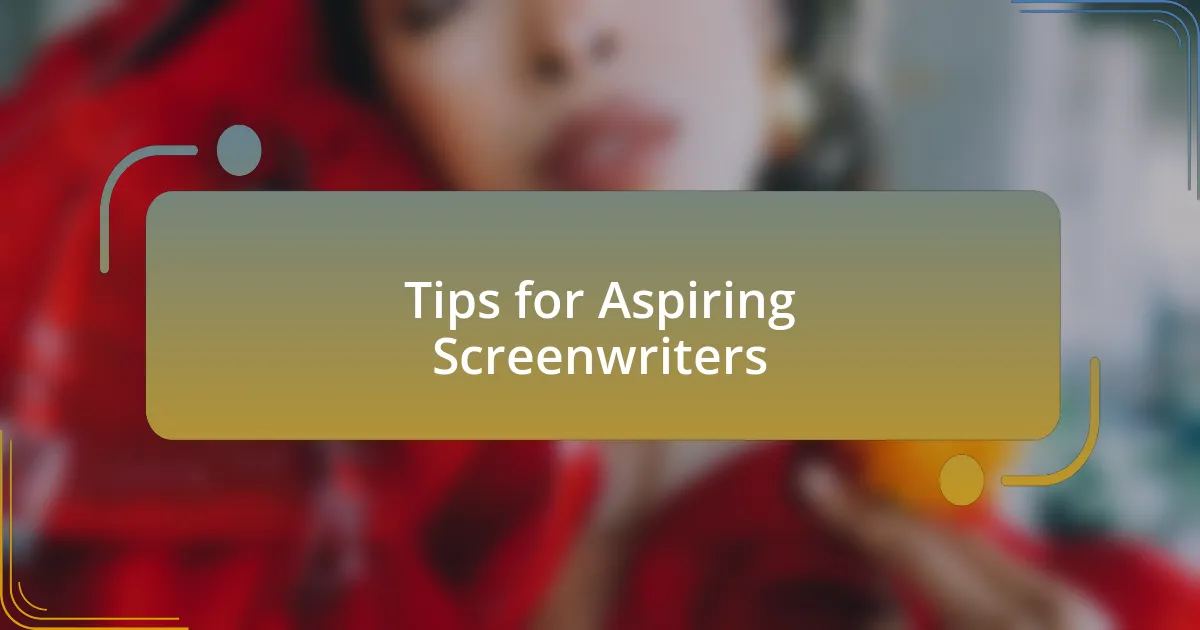
Tips for Aspiring Screenwriters
When it comes to screenwriting, I’ve found that reading scripts is as crucial as writing them. I remember opening the script of one of my favorite films and being amazed at how each scene was crafted. It wasn’t just about the dialogue; it was the pacing, the character arcs, and the subtle cues that made the story come to life. Have you immersed yourself in reading different scripts? I encourage you to explore both classic and contemporary works because it offers invaluable lessons that you can apply to your own writing.
Networking with fellow writers can transform your creative journey. During the workshop, I was fortunate to connect with an experienced screenwriter over lunch, where we shared our struggles and ambitions. That casual conversation turned into a brainstorming session, where we exchanged ideas that invigorated my perspective. Have you ever left a conversation feeling more inspired than when you entered? I can’t emphasize enough how building relationships in this industry can lead to unexpected opportunities and insights.
Lastly, don’t shy away from feedback—it’s a vital part of honing your craft. At one point during the weekend, I nervously awaited responses to a scene I shared, bracing myself for critiques. To my surprise, the constructive criticism prompted me to rethink my approach completely, ultimately leading to a stronger narrative. How often do you seek outside perspectives on your work? Embracing this vulnerability has consistently elevated my writing, reminding me that every critique is a stepping stone toward improvement.